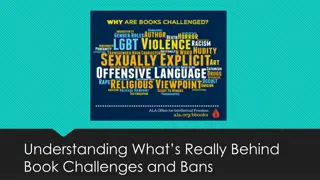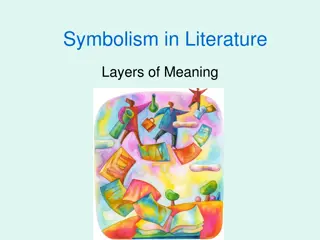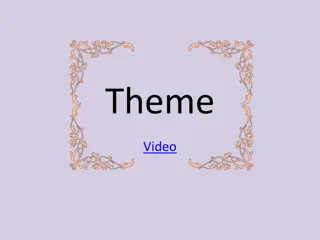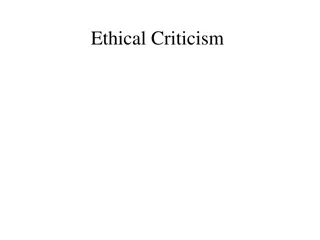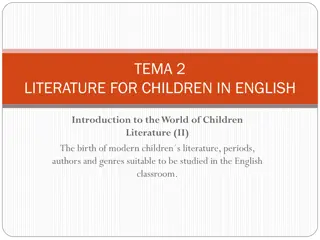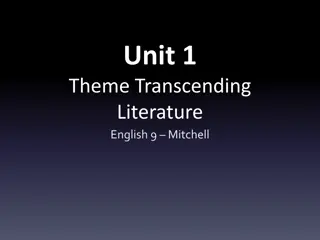Unveiling the Power of Themes in Literature
Exploring the fascinating world of themes in literature, this content delves into the essence of themes as life lessons and morals conveyed by stories. Through captivating examples and a thought-provoking narrative about a mean little boy who cried wolf, readers unravel the importance of identifying themes, understanding their implications, and applying them to the broader realities of life.
Download Presentation

Please find below an Image/Link to download the presentation.
The content on the website is provided AS IS for your information and personal use only. It may not be sold, licensed, or shared on other websites without obtaining consent from the author.If you encounter any issues during the download, it is possible that the publisher has removed the file from their server.
You are allowed to download the files provided on this website for personal or commercial use, subject to the condition that they are used lawfully. All files are the property of their respective owners.
The content on the website is provided AS IS for your information and personal use only. It may not be sold, licensed, or shared on other websites without obtaining consent from the author.
E N D
Presentation Transcript
Theme THE SEARCH FOR MEANING
What is a Theme? Theme: Life lesson, meaning, moral, or message about life or human nature that is communicated by a literary work. In other words Theme is what the story teaches readers.
Themes A theme is not a word, it is a sentence. You don t have to agree with the theme to identify it. Examples True friendship involves responsibilities as well as privileges. Losing your innocence is inevitable. Be happy with what you have instead of always wishing for more. An ounce of prevention is worth a pound of cure.
What is the theme? Once there was a mean little boy who lived in a small village. This mean little boy loved to mess with people, so one day he ran up to a sheep herder and shouted, WOLF! WOLF! A wolf is attacking the town! The sheep herder grabbed his staff and ran to defend the town, but realized he had been fooled when the boy started pointing and laughing at him. Ha ha! I made you jump, said the boy. Then the boy ran up to a farmer and shouted, WOLF! WOLF! A wolf is attacking the town! The farmer grabbed his pitchfork and ran to defend the town, but when the boy started pointing and laughing at him, he realized he had been tricked. As the boy went back to his family s farm laughing about the funny trick he played, he saw a real wolf in his father s chicken coop. As the wolf ate all of his father s chickens, the boy screamed over and over again, WOLF! WOLF! Please help us! But nobody came to help him.
Example Answers Don t ask for help unless you really need it. Don t play tricks on the people around you. Explanation: The little boy lied about needing help, so when he really did need help, no one believed him.
Identifying Themes Themesare not explicit (clearly stated). Themesare implied. Themes are bigger than the story. Big World of the Theme. Applies to the Real World. Small World of the Story
Themes are about the big picture. Not The little boy liked to mess with people. Not The little boy shouldn t have lied. Think BIGGER. Find real world advice that applies to many situations. Big World of the Theme. Applies to the real world. Small World of the Story
Review 1. Theme is what we can learn from a story. 2. Themes must be inferred. 3. Themes are not limited to story specific details: they are about the BIG world.
Practice 1. Read each story with your group. 2. Discuss what you think the theme is and writeit down in the Thinking about Reading section of your notebook (2nd tab). 3. Write another sentence explaining what happens in the story that leads you to believe this. How does the small world of the story connect to the big world theme?
didn't pay very much and she was sick of working there. Nonetheless, the work was steady and she needed all of the money that she could get. To her delight, Kelly got an interview at a big office downtown for a job that paid much more. The interview went very well and the bosses all but offered her a position. They said that she would fit the role well and they promised that they would call her back within two weeks. Kelly couldn't wait to quit her job at the movie theater. As soon as she got back she put in her two week notice. She spent the next two weeks bragging to her coworkers about her new high-paying job in the big city. Yet, two weeks passed and she received no phone call. When Kelly decided to follow up on her interview, she learned that the bosses had chosen a different candidate. Kelly was crushed. Kelly had a job at the movie theater, but it
Example Answers Don't count your chickens before they hatch. Nothing is a sure thing before it happens. Answer Explanation: Kelly conducts herself at her old job as though she had been hired at the new job. She should have waited until she received the job offer before she quit her old job; furthermore, when she quit her old job, she should have done so in a respectful way, without bragging to her coworkers.
While most of his peers enjoyed high school, David did not. "I can't wait to get to college and really start my life," he'd often tell himself. When David got to college, he found out that it wasn t much different from high school. "I can't wait to graduate and get a job so that I can really get started on my life," David would tell himself. When he graduated from college and found a job, David realized that he did not really like working that much. "I hate slaving away at work. I can't wait until my retirement. That's when my life is really going to begin," David told himself. He worked away his days and nights, enjoying them very little and always thinking about how things would be better when he retired. When he finally retired, he found that he was in too much pain to do the things that he had planned on doing earlier in life. Having nothing else to look forward to in life, David spent his final days on a bench in the sun, thinking about how much happier he would be in heaven.
Example Answers Plan for the future but live in the present. Life is what happens while you are waiting for things to happen. You have to stop and smell the roses. Answer Explanation: David spends his whole life waiting for the next stage of life. Consequently, he does not take the time to enjoy and appreciate his life while it is happening. Sadly, he never realizes how much he has missed.
homework, Sharon spent most of her time drawing. She drew elaborate manga inspired scenes of heroic warriors and beautiful princesses. She drew detailed landscapes dotted with colorful monsters and menacing villains, but she never shared her work with anyone. Time passed and Sharon continued to develop as an artist. She had mastered the skills of shadowing and texturing her artwork and she graduated from high school. Too afraid to share her work with others, Sharon pursued a college degree in business rather than art, but she continued to passionately work on her artistry when she was alone. More time passed and now Sharon was managing a department at a large corporation. She didn't really like her job, but she was comfortable doing it. By now, Sharon had pretty much given up on creating her own art, but she still appreciated the art of others. When she wasn't going to school or doing
Example Answers You will never make a shot that you don't take. You have to take a risk to receive a reward. Answer Explanation: Sharon seems to be a natural born artist who might have a promising and fulfilling career in art, but she chose a different route because she was afraid to expose her work to criticism. She may be comfortable working in business, but she isn't happy.



